-
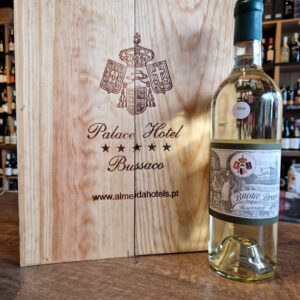 Alexandre de Almeida, founder of the oldest hotel chain in Portugal with the same name, began producing Buçaco Wines in 1917 when he realized what the Hotel Winery concept meant after many visits to European hotels, including those on the French “Côte D’Azure”. This gave him the idea to open his own winery at the Buçaco Palace, starting to produce varieties that would come to be known as the glorious “Buçaco wines”. In the early 20th century, one of the most interesting pages on Portuguese wine was created, the wine that was to become a much-envied icon, but which was always intentionally kept out of the limelight. Its creator, Alexandre de Almeida, adopted the concept of linking luxury hotels to a winery with their own wine. If we look back, ever since the first harvests we realized the importance of this icon that was served to kings, queens and heads of state, as proven by menus, proudly kept at the Hotel Palace Buçaco. Buçaco wines were just that: objects of culture limited to very restricted circles, the elite. Their fantastic and noble labels still bear the symbol of their nobility to this day and age. The Buçaco wines were and still are always produced in the same way using the same methods as in the past. The fact that the grapes come from the Dão and Bairrada regions guarantees a wonderful wine that nobly develops in the bottle. If you happen to visit this unique 5* Hotel, just North of Coimbra(between Lisbon and Porto) you will be in for an experience. Situated in the Bussaco National Forest, this 5-star hotel occupies the hunting palace of the last Portuguese kings. Palace Hotel do Bussaco is an excellent example of Manueline-Gothic architecture. Its richly decorated corridors feature antique furnishings, large paintings and traditional Portuguese glazed tiles. Its elegant restaurant offers a range of exclusive Bussaco wines(only). Classic French cuisine and traditional Portuguese dishes are served at Palace Hotel do Bussaco’s restaurant. It is decorated with paintings by João Vaz, Moorish ceilings and exotic hardwood floors. Guests can try a glass of rare Port vintage at the bar. Fantastic experience with amazing wines
Alexandre de Almeida, founder of the oldest hotel chain in Portugal with the same name, began producing Buçaco Wines in 1917 when he realized what the Hotel Winery concept meant after many visits to European hotels, including those on the French “Côte D’Azure”. This gave him the idea to open his own winery at the Buçaco Palace, starting to produce varieties that would come to be known as the glorious “Buçaco wines”. In the early 20th century, one of the most interesting pages on Portuguese wine was created, the wine that was to become a much-envied icon, but which was always intentionally kept out of the limelight. Its creator, Alexandre de Almeida, adopted the concept of linking luxury hotels to a winery with their own wine. If we look back, ever since the first harvests we realized the importance of this icon that was served to kings, queens and heads of state, as proven by menus, proudly kept at the Hotel Palace Buçaco. Buçaco wines were just that: objects of culture limited to very restricted circles, the elite. Their fantastic and noble labels still bear the symbol of their nobility to this day and age. The Buçaco wines were and still are always produced in the same way using the same methods as in the past. The fact that the grapes come from the Dão and Bairrada regions guarantees a wonderful wine that nobly develops in the bottle. If you happen to visit this unique 5* Hotel, just North of Coimbra(between Lisbon and Porto) you will be in for an experience. Situated in the Bussaco National Forest, this 5-star hotel occupies the hunting palace of the last Portuguese kings. Palace Hotel do Bussaco is an excellent example of Manueline-Gothic architecture. Its richly decorated corridors feature antique furnishings, large paintings and traditional Portuguese glazed tiles. Its elegant restaurant offers a range of exclusive Bussaco wines(only). Classic French cuisine and traditional Portuguese dishes are served at Palace Hotel do Bussaco’s restaurant. It is decorated with paintings by João Vaz, Moorish ceilings and exotic hardwood floors. Guests can try a glass of rare Port vintage at the bar. Fantastic experience with amazing wines -
Out of stock
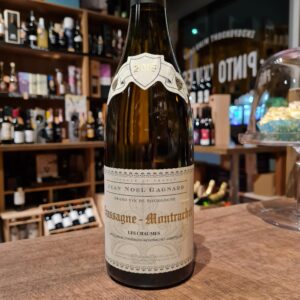 This famous Domaine has been run by Caroline Lestimé, Jean-Noël’s daughter, since 1989. Its 12.5 hectares of outstanding vineyards have been certified organic since 2014, and are now run biodynamically, though are not yet certified as such. Most of the estate’s vineyards are in the heart of Chassagne, with one vineyard in the Hautes Côtes de Beaune, which looks down on St. Aubin and was planted in 2015 at an altitude of 300 metres above sea level. The vines are Guyot-trained and planted on a moderate hill facing east. The soils here are stony calcareous clays which are enriched with biodynamic composts at the end of every winter. The wines are, in the best sense of the phrase, ‘low intervention’ wines, with each expressing the character of its site. The 2018 vintage started with good levels of winter rainfall, replenishing the soil moisture content. After a cold February and a rainy March, conditions in April were warm and dry, allowing the vineyard growth to catch up after the earlier delays. Flowering occurred under perfect conditions and summer brought consistently warm, sunny days through to harvest, which took place on August 26th. Grapes for this wine come from two similar plots: one parcel is in the upper part of the appellation (just under the road to Santenay) and the other on the lower part. 40 year old Vines Approximately 200 cases of this cuvée are made each year. Great wine to be appreciated. being an elegant and with layers of structure making this wine quite exquisite. Decanter highly recommended here.
This famous Domaine has been run by Caroline Lestimé, Jean-Noël’s daughter, since 1989. Its 12.5 hectares of outstanding vineyards have been certified organic since 2014, and are now run biodynamically, though are not yet certified as such. Most of the estate’s vineyards are in the heart of Chassagne, with one vineyard in the Hautes Côtes de Beaune, which looks down on St. Aubin and was planted in 2015 at an altitude of 300 metres above sea level. The vines are Guyot-trained and planted on a moderate hill facing east. The soils here are stony calcareous clays which are enriched with biodynamic composts at the end of every winter. The wines are, in the best sense of the phrase, ‘low intervention’ wines, with each expressing the character of its site. The 2018 vintage started with good levels of winter rainfall, replenishing the soil moisture content. After a cold February and a rainy March, conditions in April were warm and dry, allowing the vineyard growth to catch up after the earlier delays. Flowering occurred under perfect conditions and summer brought consistently warm, sunny days through to harvest, which took place on August 26th. Grapes for this wine come from two similar plots: one parcel is in the upper part of the appellation (just under the road to Santenay) and the other on the lower part. 40 year old Vines Approximately 200 cases of this cuvée are made each year. Great wine to be appreciated. being an elegant and with layers of structure making this wine quite exquisite. Decanter highly recommended here. -
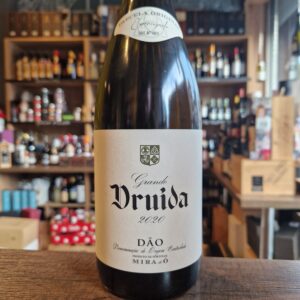 Nuno Mira do Ó is a one-man viticulture and enology powerhouse. A deep-thinking, well-traveled, generous person totally focused on expressing the great terroir of his native country. His peers look his way for guidance because his experience bringing forth wines of place covers almost every major wine region in Portugal. He launched his eponymous brand in the Dão wine region with Druida Encruzado. The wine is named for the ancient Celtic druids whose connection to the earth and plants drove their quest to achieve spiritual equilibrium through the balance of nature. As an enologist and viticulturist, Nuno is in constant search for balance between the soil, the climate, and the vines. Mira do Ó wines seek to attain perfect sensory balance with the utmost respect for nature. This is a pursuit driven by passion and a desire to share wines filled with freshness, elegance, and aging potential. These wines are handcrafted in the Dão from indigenous varietals with vineyards in granite soil sitting above 500 meters of elevation to capture the region’s cool climate. Store the bottles lying down in a cool place (15-17ºC). Drink at 11-12º C and pair with fine food.
Nuno Mira do Ó is a one-man viticulture and enology powerhouse. A deep-thinking, well-traveled, generous person totally focused on expressing the great terroir of his native country. His peers look his way for guidance because his experience bringing forth wines of place covers almost every major wine region in Portugal. He launched his eponymous brand in the Dão wine region with Druida Encruzado. The wine is named for the ancient Celtic druids whose connection to the earth and plants drove their quest to achieve spiritual equilibrium through the balance of nature. As an enologist and viticulturist, Nuno is in constant search for balance between the soil, the climate, and the vines. Mira do Ó wines seek to attain perfect sensory balance with the utmost respect for nature. This is a pursuit driven by passion and a desire to share wines filled with freshness, elegance, and aging potential. These wines are handcrafted in the Dão from indigenous varietals with vineyards in granite soil sitting above 500 meters of elevation to capture the region’s cool climate. Store the bottles lying down in a cool place (15-17ºC). Drink at 11-12º C and pair with fine food. -
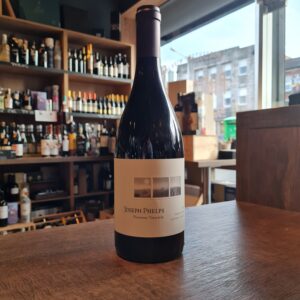 It began with a vision. A belief in the possibility of something bigger and better – something that didn’t quite exist yet. In the early 1970s, Napa Valley was a sleepy agricultural town on the brink of a fine-wine awakening. Drawing on his construction experience, Joe set about establishing the building blocks of winemaking excellence. By embedding his no-compromise philosophy deep into the bedrock of the winery, Joe set the framework to push for greatness. In 1974, he had the idea to make a unique blend each year, one that would represent the finest wine he could make from each vintage. He didn’t necessarily think it would always be a Cabernet Sauvignon either. His only thought was to make one wine that represented the best of Joseph Phelps Vineyards. Today, Insignia is widely regarded as a qualitative benchmark for Californian winemaking that has earned Joseph Phelps its longstanding reputation for excellence. The production has been scaled back to the point where all the fruit comes from estate vineyards, which is something of a rarity in California. This is now a brilliantly focused, dynamic producer that refuses to rest on its laurels. In our honest opinion in Pinto Wines this wine can compare easely with top Burgundy wines at this price point. We have aged some of these wines in store and are ready to be enjoyed.
It began with a vision. A belief in the possibility of something bigger and better – something that didn’t quite exist yet. In the early 1970s, Napa Valley was a sleepy agricultural town on the brink of a fine-wine awakening. Drawing on his construction experience, Joe set about establishing the building blocks of winemaking excellence. By embedding his no-compromise philosophy deep into the bedrock of the winery, Joe set the framework to push for greatness. In 1974, he had the idea to make a unique blend each year, one that would represent the finest wine he could make from each vintage. He didn’t necessarily think it would always be a Cabernet Sauvignon either. His only thought was to make one wine that represented the best of Joseph Phelps Vineyards. Today, Insignia is widely regarded as a qualitative benchmark for Californian winemaking that has earned Joseph Phelps its longstanding reputation for excellence. The production has been scaled back to the point where all the fruit comes from estate vineyards, which is something of a rarity in California. This is now a brilliantly focused, dynamic producer that refuses to rest on its laurels. In our honest opinion in Pinto Wines this wine can compare easely with top Burgundy wines at this price point. We have aged some of these wines in store and are ready to be enjoyed. -
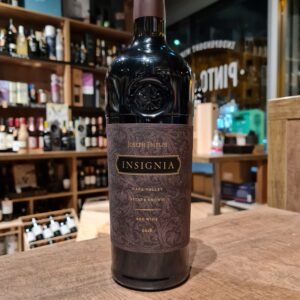 This wine is a gem in the middle of great wines produced in the renowned region of Napa Valley. Grapes are meticulously picked from the best parts of the different vineyards belonging to the estate. Great investment wine, with a fantastic long drinking window. The 2018 growing season in Napa Valley was marked by cool, mild weather. The cooler than normal spring delayed bud break, bloom and veraison by two weeks compared to the previous five years. The mild weather patterns in August and September allowed for excellent overall phenological ripening and development of a complex aroma and flavor profile in the finished wines. Outstanding flavor development and color were key indicators of this exceptional vintage. The winery was founded in 1973 by Joseph Phelps, a successful construction executive and entrepreneur whose early interest in wine led him to establish vineyards on a 670-acre former cattle ranch in Napa Valley. Over the next 42 years Joe became one of the most respected figures in the California wine industry, building Joseph Phelps Vineyards into a critically-acclaimed winery internationally known for its iconic wines and unwavering commitment to quality. Every wine in the Joseph Phelps portfolio is 100% estate-grown, overseen from grape to bottle by our dedicated winegrowing team. The family owns and farms 390 acres of vines in Napa Valley on eight estate vineyards in St. Helena, Rutherford, Oakville, the Stags Leap District, the Oak Knoll District, South Napa and Carneros, as well as 100 acres over two vineyards on the western Sonoma Coast. Strategically chosen over many decades, each vineyard has its own personality and brings a different characteristic to their wines. Their commitment to the estate-grown model is their way of ensuring consistency and the highest quality that can be achieved. Having estate vineyards give the winemaking teams unparalleled depth and diversity when it comes to producing Joseph Phelps wines. Only 12,400 cases were produced.
This wine is a gem in the middle of great wines produced in the renowned region of Napa Valley. Grapes are meticulously picked from the best parts of the different vineyards belonging to the estate. Great investment wine, with a fantastic long drinking window. The 2018 growing season in Napa Valley was marked by cool, mild weather. The cooler than normal spring delayed bud break, bloom and veraison by two weeks compared to the previous five years. The mild weather patterns in August and September allowed for excellent overall phenological ripening and development of a complex aroma and flavor profile in the finished wines. Outstanding flavor development and color were key indicators of this exceptional vintage. The winery was founded in 1973 by Joseph Phelps, a successful construction executive and entrepreneur whose early interest in wine led him to establish vineyards on a 670-acre former cattle ranch in Napa Valley. Over the next 42 years Joe became one of the most respected figures in the California wine industry, building Joseph Phelps Vineyards into a critically-acclaimed winery internationally known for its iconic wines and unwavering commitment to quality. Every wine in the Joseph Phelps portfolio is 100% estate-grown, overseen from grape to bottle by our dedicated winegrowing team. The family owns and farms 390 acres of vines in Napa Valley on eight estate vineyards in St. Helena, Rutherford, Oakville, the Stags Leap District, the Oak Knoll District, South Napa and Carneros, as well as 100 acres over two vineyards on the western Sonoma Coast. Strategically chosen over many decades, each vineyard has its own personality and brings a different characteristic to their wines. Their commitment to the estate-grown model is their way of ensuring consistency and the highest quality that can be achieved. Having estate vineyards give the winemaking teams unparalleled depth and diversity when it comes to producing Joseph Phelps wines. Only 12,400 cases were produced.

